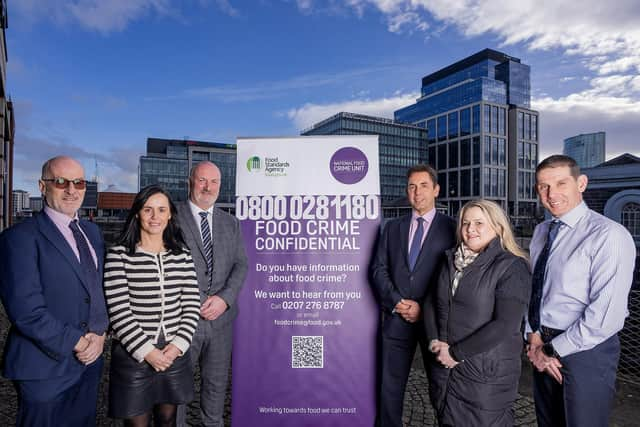The Food Standards Agency launches food fraud hotline in Northern Ireland
and live on Freeview channel 276
The Food Standards Agency’s (FSA) National Food Crime Unit (NFCU) has officially launched Food Crime Confidential, a freephone number to report food fraud in Northern Ireland.
The Food Crime Confidential number, 0800 028 11 80, can be used by anyone who has suspicion about food crime and wants to report it safely and confidentially to the NFCU.
Advertisement
Hide AdAdvertisement
Hide AdNFCU is a law enforcement arm of the FSA working to make sure your food is safe and is what it says it is.
Last year research commissioned and published by the FSA suggested that food crime can cost the UK up to an estimated £2billion.
Enabling more people to speak up and share their concerns is part of NFCU action on food fraud. Better sharing of information underpins how the NFCU is working with partners to strengthen the food system, protecting against criminal activity.
Discussing the importance of sharing information, Andy Quinn, head of the National Food Crime Unit, said: “The UK has some of the safest and most authentic food in the world, but there will always be a threat of criminality in the food system. We’ve introduced this freephone number 0800 028 11 80 - so anyone in Northern Ireland who has concerns about food fraud can report it freely and confidentially to the NFCU team.
Advertisement
Hide AdAdvertisement
Hide Ad“We’re vigilant in the fight against food fraud, tackling it with industry and regulatory partners. Sharing information is a crucial part of this as the public can give us new leads to help us tackle food crime. We review all intelligence, commence criminal investigations and identify prevention opportunities to protect legitimate businesses and the consumer.”


Knowing what food crime is and reporting it is important. The NFCU has identified seven types of food crime:
1. Unlawful processing – where food is processed using unauthorised methods or premises.
2. Misrepresentation – where a processor incorrectly states a products quality origin or safety.
Advertisement
Hide AdAdvertisement
Hide Ad3. Waste diversion – where products that should be disposed of are diverted back into the food chain.
4. Substitution – where food or product contents are replaced with lower quality ingredients without the correct labelling.
5. Document fraud – where false documents are used to sell fraudulent or substandard products.
6. Steal or dishonestly obtain food products for personal gain.
Advertisement
Hide AdAdvertisement
Hide Ad7. Adulteration – where incorrect ingredients are used to lower costs or fake higher quality.
Explaining the impact of food crime and the importance of working in partnership with industry to challenge it Ed McDonald, food fraud liaison officer, consumer protection division, Food Standards Agency NI, said: “Food crime can harm consumers and it harms our local industry. Where foods are being misrepresented that has an impact on local producers who are going through the proper channels and taking the proper precautions to bring food to the table that is healthy and nutritious. We have a strong farming community in Northern Ireland who are invested in serving up high quality products and therefore misrepresentation, substitution or unlawful processing are all things that damage their trade. That’s why, if someone has a suspicion about food fraud, they need to report it, to protect consumers and to protect livelihoods.”
As well as strengthening the sharing of information, the NFCU have supported over 500 businesses to assess their own vulnerability to food fraud so they can take action to become more resilient. Download the online online self-assessment tool.
You can report a food crime by Food Crime Confidential on 0800 028 11 80. For non-UK mobiles or calls from overseas please use 0207 276 8787. You can also report food crime online.
